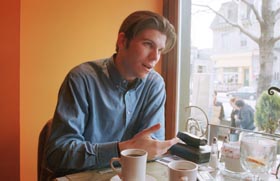
Andrew Tischler: The Prez with the Pez
Andrew Tischler will enthusiastically tell you that he's the classic profile of a McGill student: he goes to class, plays basketball and air hockey for fun, and he has a job. Well, actually, two jobs.
Tischler is the president-elect of the Students' Society of McGill University for the upcoming academic year. He is also the co-owner of Sucre Bleu!, a candy story on St-Denis Street which he started last summer with a friend. Armed with entrepreneurial spirit and political savvy, Tischler knows exactly how to speak softly and carry a big Pez dispenser.
"I'm looking forward to [becoming president]. I really can't wait to throw myself into the job," says Tischler, who, when he takes office May 1, will be the last student president of the century and the first to set up shop in the new Student Services building.
"We are moving into the building in October, and I want to make sure everything gets done properly over the summer to prepare for it," he said.
The 22-year-old Tischler is confident about having a smooth and successful term as president, partly due to his experience with Sucre Bleu! Before opening the shop that specializes in Pez candy and other things yummy, the enterprising student developed a business plan, successfully applied for grants, dealt with governments regarding permits and taxes, found suppliers and hired staff. "I wanted to create something that would sustain itself after a while, and I knew that it could be done as long as it was set up properly from the beginning."
Business acumen, however, wasn't the only quality Tischler brought to the race for president. Born and raised in Toronto, Tischler will be one of the few fluently bilingual student presidents in recent years. He picked up the language at 13 while on a three-month exchange to Paris, but is quick to add that starting a business on St-Denis was the best refresher course he could have taken.
"[Speaking French] is a skill people appreciate," Tischler noted. He plans to work closely with the francophone commissioner of the Students' Society next year. "My wish for the francophone community, as it is for all students at McGill, is for them to feel as if SSMU represents them."
It comes as no surprise that an out-of-province student businessman would like to focus on student employment. Tischler, himself a former employee of Boubouf, the now defunct student haunt across from the Roddick Gates -- would, ideally, like to see students working in their field of study and making money. "I want to help start projects where students can get work experience while they study. There's a lot of on-campus projects to hire students for."
A case in point may be the greenifying of McGill. Together with people from such disciplines as geography, history and engineering, Tischler is drafting an environmental workgroup to make the campus and its surrounding areas a greener space.
Tischler also talks about giving students the "enabling conditions" in order that they may take advantage of everything available to them. "One of the biggest barriers to students is money. I read that only 15 per cent of a student's budget goes to tuition, and the rest is allocated for rent, food, clothing and travelling back home." Next year, the SSMU hopes to alleviate the problem by posting ride boards on the Internet.
However, notes Tischler, the irony is that most rides offered are local and students bearing the greatest travel costs aren't travelling locally. His solution would include discounts on airfares for McGill students based on large bookings. "It's an example where we can use the fact that there are so many students as an asset, instead of a liability."
Regarding his future, Tischler admits that he's not certain of what's in store: "Maybe a career in diplomacy," the political science major mused. True, he doesn't come from political lineage; his father is an engineer, his mother a microbiologist, while his siblings are musicians. But, if the diplomatic sphere comes calling, surely the combined experience of Sucre Bleu! and student politics will sweeten the deal.
Leslie Stojsic
| 


